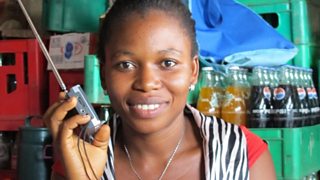What would a post-2015 development goal on free media mean?
James Deane
Director, Policy and Learning
Tagged with:

"Eradicating poverty" is the headline recommendation of a published last week outlining a new development agenda for the 21st Century. If the panel's recommendations are accepted, another issue will have found its way into the heart of the international development agenda for the first time: a commitment to support free and independent media and access to information.
proposes an "indicative" set of 12 new universal goals, the first of which is to end extreme poverty by 2030. One of the 11 other goals – alongside those focused on health, the empowerment of girls and women, improving food security and so on - is one designed to "ensure good governance and effective institutions".
Five elements are identified in the report as necessary for achieving this goal. One of these is to "ensure people enjoy freedom of speech, association, peaceful protest and access to independent media and information". Another is to "guarantee the public's right to information and access to government data".
Commissioned by UN Secretary General Ban Ki-Moon, this report offers an impressive reframing of what is required to move the development agenda on from the existing Millennium Development Goals due to expire in 2015. It manages to integrate just about all the key development challenges that humanity faces whilst avoiding – mostly – what many had feared would simply be a long wish list without clear priorities. The report blends a fresh set of targets with a clear commitment to rights and good governance and does so more explicitly than the existing development agenda it seeks to replace.
The original Millennium Declaration agreed in 2000 – which articulated the Millennium Development Goals due to expire in 2015 – also affirmed freedom as one of the fundamental values underpinning the MDGs and urged a commitment "to ensure the freedom of the media to perform their essential role and the right of the public to have access to information". That Declaration has tended to be forgotten, however. Instead, it is the eight Goals it laid that have galvanised international attention in the interim years.
The new High-Level Panel report goes a step further and recommends that media freedom and access to information should be included in the targets in themselves. This is no great surprise. David Cameron, the co-chair of the Panel, has repeatedly called for a set of "golden threads" to be woven into the development agenda. These include good governance, the rule of law, clear and stable property rights, strong civil institutions, free and fair trade and free media. All of these objectives are reflected in this report.
The fact that "access to independent media and information" has ended up as a recommended target is welcome on many levels. It is especially so as the focus is not just on the existence of a free and independent media (which tends to be captured in most media freedom indicators), but on access to media and information.
Having a free press – even if only 10% of the population have access to it – can mean that a country receives a high score in standard international media freedom indicators. If the post-2015 agenda can encourage principles of media freedom as well as access to independent media, then they will have played a key role in moving a critical issue forward.
The report outlines a new Global Partnership and says: "People must be central to a new global partnership. To do this they need the freedom to voice their views and participation in the decisions that affect their lives without fear. They need access to information and to independent media." Such a partnership should, the report argues, be a principal priority for future development action.
There will be major political challenges to be overcome if the recommendations of this report are to be included in the final UN agreement on the new development agenda, to be agreed in 2015. Placing issues of media freedom – or even good governance – so explicitly at the heart of the post-2015 agenda is unlikely to command universal support at the UN.
There are challenges too of implementation. As the report highlights, access to information through mobile telephony and the internet has been transformed since the original Millennium Declaration was published in 2000. The sheer pace and scale of change in communication technology, especially across the developing world, was not predicted then, and certainly not by the development sector. Huge information and communication gaps remain, especially in fragile states where more than half of people live in poverty. Adapting development policies to one of the fastest moving arenas of human innovation will be difficult. Only a very few development agencies have significant institutional expertise in supporting improved access to independent media and information. Major progress has, however, been made in the development sector in opening up and supporting improved access to data, another of the welcome and critical issues highlighted in the report.
This report is hugely welcome. It presents a fresh, ambitious agenda that provides a comprehensive framework for meeting a set of immense development challenges. It does so by putting issues of governance and rights – including freedom of the media – at its heart, not its periphery. That has not happened before.
The hope is that this agenda will be embraced by the international community and be reflected when a new set of goals are eventually agreed in 2015. Much needs to be done to transform that hope into a reality.
James Deane is Director of Policy and Learning at Βι¶ΉΤΌΕΔ Media Action, the Βι¶ΉΤΌΕΔ's international development charity. These views should not be taken to reflect those of the Βι¶ΉΤΌΕΔ itself.
Related links
Follow Βι¶ΉΤΌΕΔ Media Action on and
